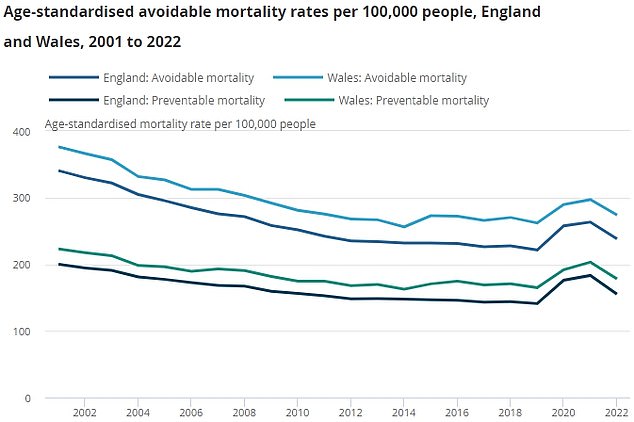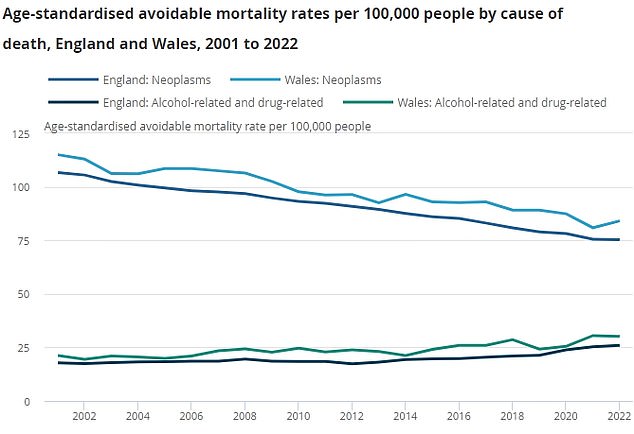Deaths from alcohol and substance abuse are soaring, new official figures show, with experts blaming excessive alcohol and drug use caused by the lockdown
The number of deaths caused by alcohol and drugs is rising in England and Wales, official data shows.
The number of fatalities due to substance abuse has risen to almost 13,000 in England and more than 800 in Wales by 2022.
Both figures represent significant increases compared to pre-pandemic figures, when the numbers stood at 10,511 and 667 respectively.
Experts have blamed binge drinking during the Covid pandemic and rising opiate abuse – including heroin and prescription drugs – for destroying the lives of Britons.
The latest figures from the Office for National Statistics (ONS) show that a total of one in five deaths in England and Wales were considered avoidable in 2022, the most recent year in which full data is available.
Deaths from substance abuse have continued to rise compared to before the pandemic, with 25.9 deaths per 100,000 in England in 2022, and 30.2 per 100,000 in Wales (stock image)

This graph from the Office for National Statistics shows how preventable deaths have fallen in 2022 compared to the previous year, but are still higher than before the pandemic

Cancer remains the biggest preventable cause of death in England and Wales, but is still declining overall. However, deaths from alcohol and drugs are increasing in both countries
Preventable deaths are deaths that the ONS believes are preventable or treatable among people under the age of 75.
Examples include vaccine-preventable diseases such as whooping cough, or diseases where a cancer patient might have had a different outcome if treated earlier.
England recorded 12,916 preventable drug and alcohol deaths in 2022. This was an increase from 12,549 the year before and an increase from 10,511 before the pandemic.
Ian Hamilton, an addiction expert at the University of York, told MailOnline he suspected the rise is due to excessive alcohol consumption as a result of the Covid lockdowns overtaking people.
“The increase in alcohol-related deaths is due to excessive consumption during the Covid pandemic,” he said.
‘We know that a significant proportion of the population has increased alcohol consumption during this period, partly to cope with lockdown and stress.’
Research shows that a quarter of people increased their alcohol intake during lockdown, with people with an existing drinking problem said to be hardest hit.
And the ONS data itself shows that alcohol-related deaths have risen to a record high in the wake of Covid.
Dr. Richard Piper, CEO of Alcohol Change UK, today branded the increase as ‘very worrying’.
He added that while the pandemic certainly played a role, other pressures had also contributed to the problem.
‘The cost of living crisis has also had a huge impact on so many lives, with heavy drinkers hardest hit.’
Dr. Piper said more must be done to curb the negative impact of alcohol on people’s lives and called for measures such as minimum unit prices and advertising restrictions.
Mr Hamilton added that alcohol was only part of the picture, with drug use remaining a problem – particularly the abuse of both illicit and prescription opiates, such as painkillers.
‘The leading drug contributing to deaths continues to be opiates, especially heroin. “There is an aging cohort of people who are dependent on heroin and are dying prematurely due to physical-related problems,” he said.
Cancer remained the biggest cause of preventable deaths in the ONS report.
England recorded 37,006 such deaths in 2022, while Wales recorded 2,536.
Although this is an overall fall since 2001, when combined preventable deaths from the disease were around 43,000, experts said delays in NHS cancer treatment meant too many people were dying unnecessarily.
Data from NHS England shows that only 66.6 per cent of cancer patients in April started treatment within 62 days of their original referral. The goal is 85 percent.
Across the border, in Labor Run Wales, only 60.5 percent of cancer patients started treatment within 62 days, compared to the target of 75 percent.
Professor Karol Sikora, an oncologist with more than 40 years of experience, said that while the overall reduction in deaths is due to decades of improved cancer care, there is still work to be done.
He said many more lives could be saved if the NHS not only met its cancer targets but also reformed them.
“The biggest benefit will come from speeding diagnosis to initial treatment times,” he added.
‘The diagnosis of 62 days to treatment goal is not fit for purpose; it should be 14 days.”
Total ONS data for 2022 showed there were 117,498 avoidable deaths in England and 8,114 in Wales.
This is a decrease on the previous year, when England recorded 130,641 such deaths, and Wales 8,854.
However, the number of avoidable deaths is still higher than in 2019, the last year of data before the Covid pandemic hit.
The figures for that year recorded just 108,330 avoidable deaths in England and 7,729 in Wales.
Commenting on the overall avoidable death figures, Veena Raleigh, senior fellow at think tank The King’s Fund, said the data was ‘devastating’.
“This is both a damning indictment of the quality of our public health policies and healthcare services, and yet more evidence of the poor and deteriorating health status of the population,” she said.
‘Of the 9.4 million working-age adults who are not working, 2.8 million of these adults are unable to work due to long-term illness.
‘With an NHS waiting list for treatments exceeding seven million, including more than 400,000 people waiting for potentially life-saving heart care, and long waiting times to see a GP, the forecast sees better public health in the short to medium term looks bleak. ‘
She added that public health budgets were being cut and the NHS being ‘under-resourced’ was having devastating consequences.
“This heavy burden of preventable ill health and death has devastating consequences for individuals, families, communities and the economy,” she said.
‘Preventing ill health and reducing premature deaths is undoubtedly one of the greatest challenges of our time.’
